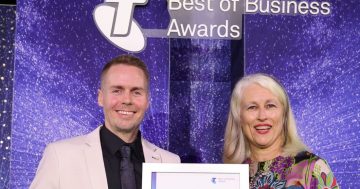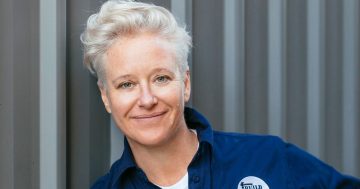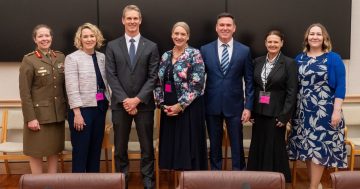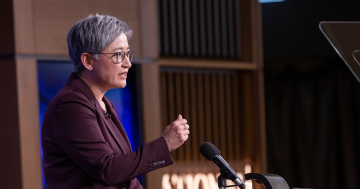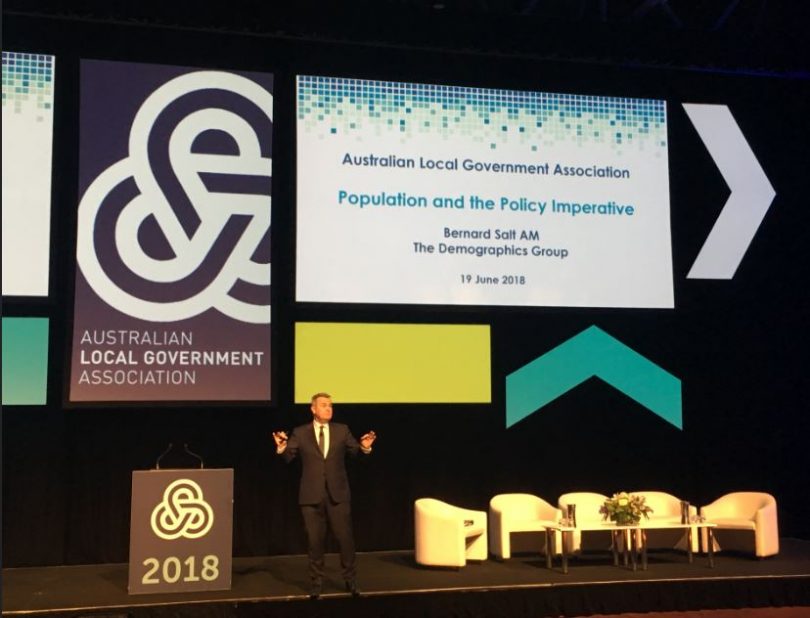
Respected demographer Bernard Salt from The Demographics Group. Photo: Ian Campbell.
Social researcher and futurist Bernard Salt has provided local councils from around Australia with a blueprint to future prosperity.
“The first thing is very easy and doesn’t cost anything – it’s unity, a galvanised community makes a powerful difference to your ability to do stuff, to deliver stuff,” Mr Salt told the 875 delegates at the National General Assembly of Local Government underway in Canberra.
Drawing on a catalogue of research including the 2016 Census, Mr Salt stridently reinforced the theme of the Assembly, ‘Australia’s Future – Make it Local’.
“Sometimes a simple question with a simple response speaks volumes about the values of the Australian people,” Mr Salt said, pointing to the religion question in the census.
“Seven million people said – I am nothin, incredible because that figure is up 45% in five years.
“You can not move the thinking of seven million people by 45% in five years without the equivalent of an atom bomb going off in the heartland of middle Australia,” Mr Salt said.
What happened between 2011 and 2016 to bring about such a rapid change? The boss of The Demographics Group believes the impacts of the Royal Commission into child abuse has played its part in a bigger change of values thats underway.
Mr Salt believes people weren’t willing to simply ‘tick the religion box’ without a second thought anymore, he says the same trends are playing out in peoples attitudes towards big political parties, big unions, and big business.
“I think middle Australia is saying I am losing faith in big institutions,” he said.
“The Australian people are saying – if you want to connect with me it needs to be local, tribal, communal, familiar, authentic relationships.”
Earlier in 2018, Mr Salt and his group went looking for the keys to being a successful, prosperous community; 1,800 communities around Australia were analysed, villages with a population of 200 people up to Sydney.
The winners were described as ‘Goldilocks Towns’ that, in theory, deliver this nation’s best country-town lifestyle.
The winners were:
NSW: Griffith
Western Australia: Margaret River
Queensland: Goondiwindi
South Australia: Nairne
Victoria: Woodend
Northern Territory: Katherine
Tasmania: Margate
“We ran them [the towns] through a series of filters – high levels of employment, high levels of growth, high levels of economic diversity,” Mr Salt explained.
“Two towns came out on top – Goondiwindi and Griffith.”
Mr Salt said the study is likely to become a yearly report in order to shift the paradigm and change the way wider Australia thinks about regional communities.
With 70% of Australians living in a metropolitan area, Mr Salt believes the level of sophistication, opportunity, and global connectivity within regional areas needs to be highlighted and developed for country towns to grow.
Mr Salt’s checklist for successful local town growth:
- Airport
- University
- Local media
- Military/CSIRO
- Hospital
- National event
- Private school
- Affordable housing
- Aged care facility
- Sport and convention centre
- Local entrepreneurs and business awards
- Tourist attractions
- Vocational training
- Cafe culture
- State/Federal Government
“We want to cultivate people who are ‘can do’ and create opportunities,” Mr Salt said.
Above all the futurist suggested that in a time when people were disengaging and disenchanted with ‘big’, local government needed to be a glue in the community.
“The communities that I find are the most difficult are the ones that are divided,” Mr Salt said.
“You have one group who think you should go this way and another who think that way, its up to the Mayor, its up to the CEO to fuse them together.
“That’s the leadership challenge; to create a common vision of what the community should look like.”
The vast presentation highlighted some of the other drivers of local prosperity:
*In 2016 just over 1 million people living in Australia where born in the United Kingdom, a slip of 1% on the 2011 census.
The number of people born in China increased by 60% (510,000), India 54% (455,000), Philippines 36% (232,000), and South Korea 33% (99,000).
“What will underpin Australian culture in the 21st Century? You would have to say – the Asianisation of the Australian culture,” Mr Salt said.
“Today we are a cosmopolitan, pliable, absorbent, fusion culture.
“The Indians and the Chineses arriving through universities will find their way into middle-class prosperity very quickly.”
*The changing make-up of households also needs to be factored into Council’s prosperity blueprint according to Mr Salt.
While the number of traditional nuclear families continues to grow into the future – up 51% by 2036, more and more households are ‘couple only’ – up 150% by 2036, ‘single households’ – up 183% by 2036, ‘one parent households’ – up 122%.
Mr Salt calls it the ‘lonely-fication of Australian suburbia largely as a result of ageing baby boomers losing their partner.
“The school culture that defined suburbia in the 1980’s the 1990’s gives way to a quietening of suburbia and councils will be at the coalface dealing with this,” Mr Salt said.
*Our continents 25 years of successive growth are part of the change as people strive for a higher standard of living, with more lifestyle and retirement options.
*Gowth occupations – sales assisstant, aged or disability care, chef, domestic cleaner, kitchen hand, construction, nursing, child care, barister, management and marketing consultants.
“What job could exist in your community in 2030 that no one has even thought of? You can’t predict that job but you need to remain open to ideas and responsive to change.”
*Declining occupations – secretary, retail manager, general clerk, crop and livestock farmer, checkout operator, manufacturer, bank worker, wholesaler, cook, miner.
“We need a new verb in Australia to descirbe ‘fit-in-ability’ – I will take this skill set and fit in with whatever configuration emerges in the office, in the workplace.”
In concluding Mr Salt said, “Here is a narrative that builds a stronger Australia, how can your council area be part of that story?”













